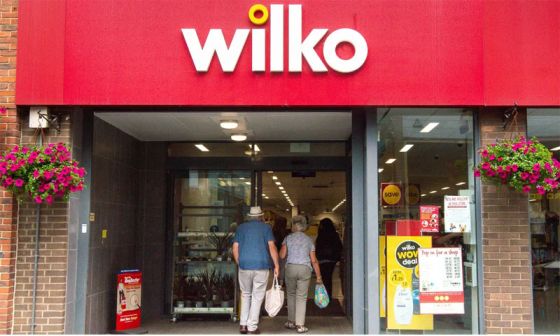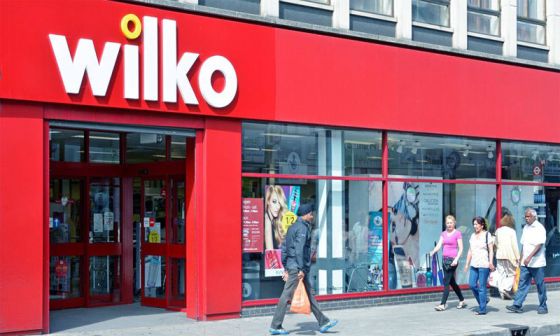Discover effective strategies for navigating business closures when shopping. Learn about refunds, credit protection, and maximizing voucher use to safeguard your purchases.

In recent years, numerous prominent retail chains have shuttered their operations, accompanied by a multitude of smaller enterprises meeting the same fate. The latest addition to this list is Wilko, a well-known retailer grappling with financial difficulties. This mirrors the unfortunate trend of beloved high street brands facing challenges.
Upon the collapse of businesses, I receive a deluge of inquiries from concerned readers regarding undelivered purchases, unused credit notes and gift cards, as well as the need to return items they’ve acquired. To address these concerns, I’ve compiled a comprehensive guide outlining your rights and offering strategies for safeguarding yourself when making payments for products and services.
What occurs in the event of a business facing financial collapse?
Regrettably, when a company faces insolvency, you find yourself among a lengthy roster of creditors seeking owed funds from the enterprise. In reality, you often find yourself at the back of the line, making it a rarity to reclaim any funds. In the event of a company entering liquidation, any money you’ve disbursed, as well as vouchers and gift cards you possess, tend to evaporate – even in cases where you’ve yet to receive the merchandise.
Should you wish to address a grievance or believe you’re owed money, the company’s website should supply information about the appointed liquidators who manage the process of wrapping up business affairs and assets. However, the transition into administration is typically not instantaneous. A window of opportunity often exists, during which you can swiftly utilize vouchers or reclaim card payments before the company collapses. Occasionally, as seen with Wilko, the potential for a rescue or acquisition arises. Yet, this outcome is far from guaranteed, and it doesn’t guarantee the return of your funds or credit.
Preparation for businesses going under is inherently uncertain. Staying updated with the news and retaining awareness of your vouchers and store credit is crucial. On occasion, company administrators might authorize voucher or card usage, or even honor them. However, the guiding principle remains: upon learning of a company’s financial woes, it’s advisable to utilize any existing store credit.
Sometimes, telltale signs emerge. Monitoring review platforms becomes crucial if you haven’t received your purchased items. A sudden influx of one-star reviews is a substantial indicator of impending issues. Companies abruptly discontinuing customer support lines is an unfavorable signal, as are unanswered emails and neglected social media posts. At this juncture, it’s prudent to approach your bank and explore the possibility of initiating a ‘charge back’ to retrieve your funds.

Read This: Shortfall in Energy Support Scheme: £3 Million Assistance Missed by Over 700,000 Households
What measures can I take to safeguard myself from potential business closures while shopping?
While it’s impossible to safeguard against business closures, you can adopt a strategy that enhances your odds of receiving a refund.
Opting to pay via a credit card offers a significant advantage. For transactions ranging between £100 and £30,000, the credit card provider shares responsibility with the goods or services supplier in cases of contractual breaches or misrepresentations. This protection extends to scenarios involving undelivered goods, damaged items, malfunctioning products, or instances of supplier deception. Remarkably, this coverage remains effective even when a company undergoes financial collapse.
Even if you’ve only made a deposit payment for an item on your credit card, the coverage persists. Theoretically, this deposit amount can be below £100, provided that the overall cost of the goods falls within the £100 to £30,000 range. In such cases, the coverage extends to the total value of the item.
For instance, if you pay a £50 deposit for a £1,000 bed using your credit card and settle the rest in cash, should the company face liquidation, the credit card provider would be obliged to reimburse the entire £1,000. While there might be discussions regarding the phrasing of the Act concerning deposits, the potential exists for obtaining a complete refund of the sale price, even if only a nominal amount like one pound was paid as a deposit.
Vouchers and gift cards
A voucher refers to a physical or virtual document, often in the form of a card, that provides the holder with the privilege to acquire goods or services up to a predetermined prepaid value. Vouchers are frequently obtained as gifts or given in place of a refund. Notably, a significant number of individuals possess vouchers for services or items that couldn’t be utilized during the pandemic, spanning from flights to festivals.
Typically, vouchers bear an expiration date, requiring them to be utilized before that date to avoid forfeiture. Many vouchers meet the fate of languishing in wallets and purses, overlooked and forgotten. This tendency is exploited by businesses, as people often neglect to redeem them. To prevent this, it’s advisable to set a reminder in your calendar at least a month before the expiry date to ensure you make use of the voucher.
Gift cards operate on similar principles to vouchers and are mainly purchased as presents. Likewise, they should clearly display their expiration dates; however, there have been instances of disputes arising due to fading or unclear date printing. In cases where a complaint is raised about a gift card, it usually falls to the purchaser to address the issue.
As previously mentioned, when news circulates that a business is facing financial difficulties, it’s prudent to promptly utilize any existing vouchers. If the business has a brick-and-mortar store, visiting it in person and making purchases is advisable. This way, you can leave with the purchased items immediately, as opposed to waiting for a potentially uncertain online delivery.
Historically, a general assumption prevailed that if a business on the brink of bankruptcy was acquired or rescued by another entity, the new owner would honor gift cards and vouchers, provided the company continued its operations. However, recent years have introduced complexities to this practice. Some new owners have suggested issuing new vouchers, which has resulted in numerous complaints. To be succinct, it’s unwise to presume that your vouchers will be transferrable under new management.
Returns and refunds
When awaiting the delivery of a previously made purchase or dealing with the need to return a defective product, the situation can become intricate. Similar to managing store credit, swift action becomes essential. It’s advised to promptly reach out to your bank or card provider and provide a comprehensive explanation of the circumstances. Request them to initiate a “chargeback” to retrieve your funds.
As frequently highlighted in this column, chargeback operates as an agreement among banking service providers. It empowers card providers to reclaim funds if the retailer fails to deliver the purchased goods, charges you without authorization, or displays signs of potential insolvency. When communicating with your bank or card provider, express your awareness of the issues surrounding the business and urge them to promptly execute the chargeback process. While some instances might necessitate completing a chargeback request form, in cases where a company is undergoing liquidation, the card provider should prioritize fund retrieval. Therefore, ensure they comprehend the rationale behind your request for reimbursement.
Handling product returns can pose significant challenges. It’s imperative to make a pragmatic choice regarding whether to risk returning defective items to the retailer. This is crucial because if the company enters administration during the return process, there’s a high likelihood of losing your funds unless the business agrees to an immediate refund. To mitigate this risk, consider reaching out directly to the manufacturer of the goods, if applicable, and engage in direct negotiations with them.
Complaints
When a business faces insolvency, typically, the avenue for addressing your grievances closes. This applies equally to complaints that have been submitted to an Ombudsman or an Alternative Dispute Resolution Scheme (ADR).
Yet, in certain scenarios, discussions might unfold involving the Courts, Government, or regulatory bodies, aimed at devising schemes to assist individuals impacted by the company’s winding-up process. These particulars will be outlined on the business’s website, and you should expect to be informed by the appointed liquidators regarding any proposed measures that could have implications for you.
Read More: